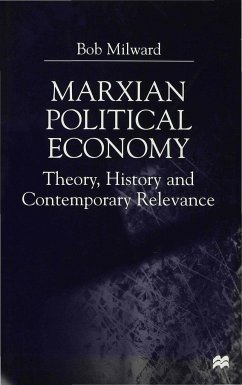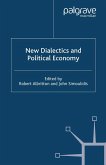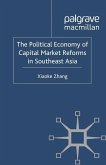This book challenges the notion that the Marxian approach is no longer relevant to the problems of contemporary society in the post-Soviet world. The first part of the book deals with the distinctive method of Marx's political economy, with an emphasis on its origins and the problems that arise out of misinterpretations of Capital . The second section applies this method to some of the key contemporary issues including unemployment, globalization and the crisis of the welfare state, and suggests that the approach of Marxist political economy remains a highly relevant and intellectually sound method of analysis.
'This is a major contribution to political economy. The author states that his aim is to stimulate debate; he will surely succeed in this, but the book will do more than that.
The book begins, logically by showing the importance of a Marxian analysis of current problems. As the author points out, the demise of state socialism does not diminish the need for radical analysis in an age of growing disparity of wealth in the works and one where even the richest countries repeatedly fall into depression. This sets the scene for an extended discussion of Marxian methodology, done in a way so that the jargon does not obliterate the clarity of expression as it does in so many books about Marx. This leads on to the second half of the book that applies the earlier analysis to contemporary problems. These include discussions on concentration in industry, unemployment, the role of the state and the crisis of the welfare state.
This book is magisterial in its command of theissues, and this, combined with the fluency of the style, makes it the authoritative text in the field.' - Brian Atkinson, former Chair of the Economics and Business Education Association
'[T]his book is both timely and necessary. It is timely because the re-examination of Marx as a serious thinker, untainted by the excesses perpetrated in his name, is now overdue and it is necessary if serious scholars are to rid themselves of the debilitating post-communist smugness and ignorance afflicting so many of them...In a rigorous, logically consistent, manner it leads us through the stages of capitalist development persuasively arguing the case for the inevitable crisis. This is certainly not a crass, sensationalist doomsday approach but a measured, subtle and serious work demonstrating an enviable mastery of its material. Oh, and I enjoyed reading it as well.' - Paul McKeown, Senior Lecturer in Economics, University of Central Lancashire
'His effort deserves our attention...' - Cheol-Soo Park, Review of Political Economy
The book begins, logically by showing the importance of a Marxian analysis of current problems. As the author points out, the demise of state socialism does not diminish the need for radical analysis in an age of growing disparity of wealth in the works and one where even the richest countries repeatedly fall into depression. This sets the scene for an extended discussion of Marxian methodology, done in a way so that the jargon does not obliterate the clarity of expression as it does in so many books about Marx. This leads on to the second half of the book that applies the earlier analysis to contemporary problems. These include discussions on concentration in industry, unemployment, the role of the state and the crisis of the welfare state.
This book is magisterial in its command of theissues, and this, combined with the fluency of the style, makes it the authoritative text in the field.' - Brian Atkinson, former Chair of the Economics and Business Education Association
'[T]his book is both timely and necessary. It is timely because the re-examination of Marx as a serious thinker, untainted by the excesses perpetrated in his name, is now overdue and it is necessary if serious scholars are to rid themselves of the debilitating post-communist smugness and ignorance afflicting so many of them...In a rigorous, logically consistent, manner it leads us through the stages of capitalist development persuasively arguing the case for the inevitable crisis. This is certainly not a crass, sensationalist doomsday approach but a measured, subtle and serious work demonstrating an enviable mastery of its material. Oh, and I enjoyed reading it as well.' - Paul McKeown, Senior Lecturer in Economics, University of Central Lancashire
'His effort deserves our attention...' - Cheol-Soo Park, Review of Political Economy








